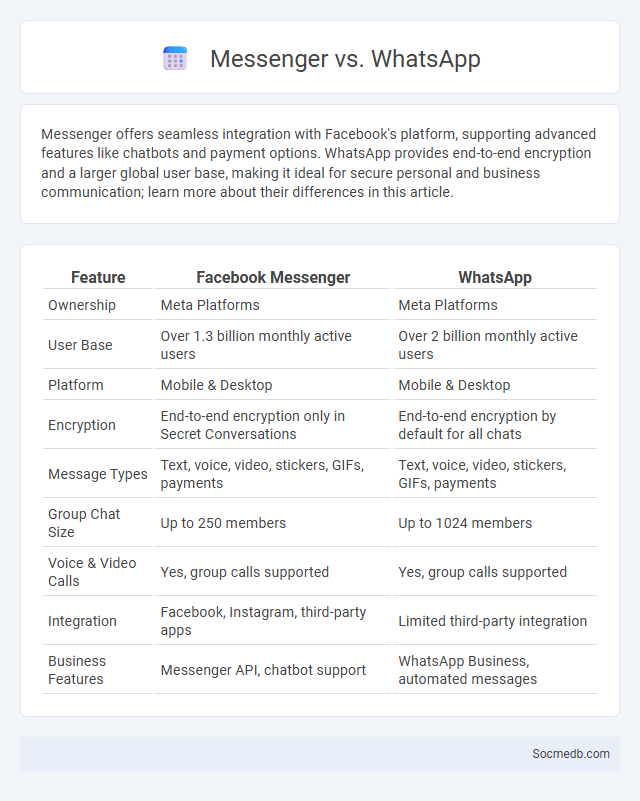
Photo illustration: Messenger vs WhatsApp
Messenger offers seamless integration with Facebook's platform, supporting advanced features like chatbots and payment options. WhatsApp provides end-to-end encryption and a larger global user base, making it ideal for secure personal and business communication; learn more about their differences in this article.
Table of Comparison
| Feature | Facebook Messenger | |
|---|---|---|
| Ownership | Meta Platforms | Meta Platforms |
| User Base | Over 1.3 billion monthly active users | Over 2 billion monthly active users |
| Platform | Mobile & Desktop | Mobile & Desktop |
| Encryption | End-to-end encryption only in Secret Conversations | End-to-end encryption by default for all chats |
| Message Types | Text, voice, video, stickers, GIFs, payments | Text, voice, video, stickers, GIFs, payments |
| Group Chat Size | Up to 250 members | Up to 1024 members |
| Voice & Video Calls | Yes, group calls supported | Yes, group calls supported |
| Integration | Facebook, Instagram, third-party apps | Limited third-party integration |
| Business Features | Messenger API, chatbot support | WhatsApp Business, automated messages |
Introduction: Understanding Messenger and WhatsApp
Messenger and WhatsApp are leading instant messaging platforms owned by Meta, boasting over 2.8 billion combined active users worldwide. Messenger integrates seamlessly with Facebook, offering chat, voice, and video calling features, while WhatsApp emphasizes end-to-end encrypted messaging and broad international reach. Both applications drive real-time communication, business outreach, and social connectivity across diverse demographics and regions.
Brief Overview of Messenger
Messenger is a widely used instant messaging app developed by Meta Platforms, enabling real-time text, voice, and video communication. It supports multimedia sharing, group chats, and integrates seamlessly with Facebook for enhanced social connectivity. Messenger's end-to-end encryption and business tools make it a versatile platform for personal and professional interactions.
Brief Overview of WhatsApp
WhatsApp is a globally popular instant messaging app with over 2 billion users, known for its end-to-end encryption that ensures secure communication. It supports text messaging, voice and video calls, group chats, and multimedia sharing, making it a versatile platform for personal and business use. Owned by Meta Platforms, WhatsApp continues to innovate with features like WhatsApp Business and payment integration, enhancing user experience and connectivity.
User Interface Comparison: Messenger vs WhatsApp
Messenger offers a vibrant interface with integrated features like Stories and chatbots, catering to a diverse user base with multimedia options and customizable themes. WhatsApp features a minimalistic design focused on ease of navigation, emphasizing privacy with end-to-end encryption and straightforward messaging tools. Both platforms optimize user experience differently, with Messenger blending social networking elements while WhatsApp prioritizes simplicity and secure communication.
Features and Functionalities: A Detailed Look
Social media platforms offer diverse features such as real-time messaging, multimedia sharing, and live streaming, enhancing user engagement and connectivity. Advanced algorithms personalize content feeds, while robust privacy settings empower users to control their data and interactions. Integration with e-commerce tools and analytics dashboards further enables businesses to optimize their social media strategies effectively.
Security and Privacy: Which App Is Safer?
Social media security and privacy vary significantly across platforms, with apps like Signal and Telegram prioritizing end-to-end encryption to protect user communications. Facebook and Instagram, owned by Meta, often face criticism for data-sharing practices and potential vulnerabilities to breaches. Users seeking the safest experience should consider apps with robust encryption, transparent data policies, and frequent security updates to minimize risks.
Platform Compatibility and Accessibility
Social media platforms are designed to be compatible across various devices, including smartphones, tablets, and desktops, ensuring seamless user experiences regardless of hardware. Accessibility features such as screen readers, captioning, and adjustable text sizes enable users with disabilities to engage fully with content. Prioritizing platform compatibility and accessibility enhances Your ability to connect with diverse audiences and maximize social media impact.
Group Chat and Collaboration Tools
Group chats and collaboration tools on social media platforms enhance real-time communication and project management among users, boosting productivity and engagement. Features like file sharing, task assignment, and video conferencing streamline workflows and foster seamless teamwork across different locations. Integration with other apps and customizable notifications ensure efficient collaboration tailored to diverse organizational needs.
Integration with Other Apps and Services
Social media platforms enhance user experience and functionality by integrating seamlessly with various apps and services such as e-commerce sites, messaging apps, and productivity tools. This integration allows for automated content sharing, streamlined communication, and personalized user interactions, boosting engagement and convenience. APIs and third-party tools enable smooth connectivity, facilitating cross-platform features like single sign-on and synchronized notifications.
Conclusion: Which Messaging App Wins?
Choosing the right messaging app depends on your priorities like security, user base, and features. WhatsApp leads with its vast user network and end-to-end encryption, while Telegram offers advanced privacy options and customization. Your ideal messaging app balances usability and privacy tailored to your communication needs.
 socmedb.com
socmedb.com